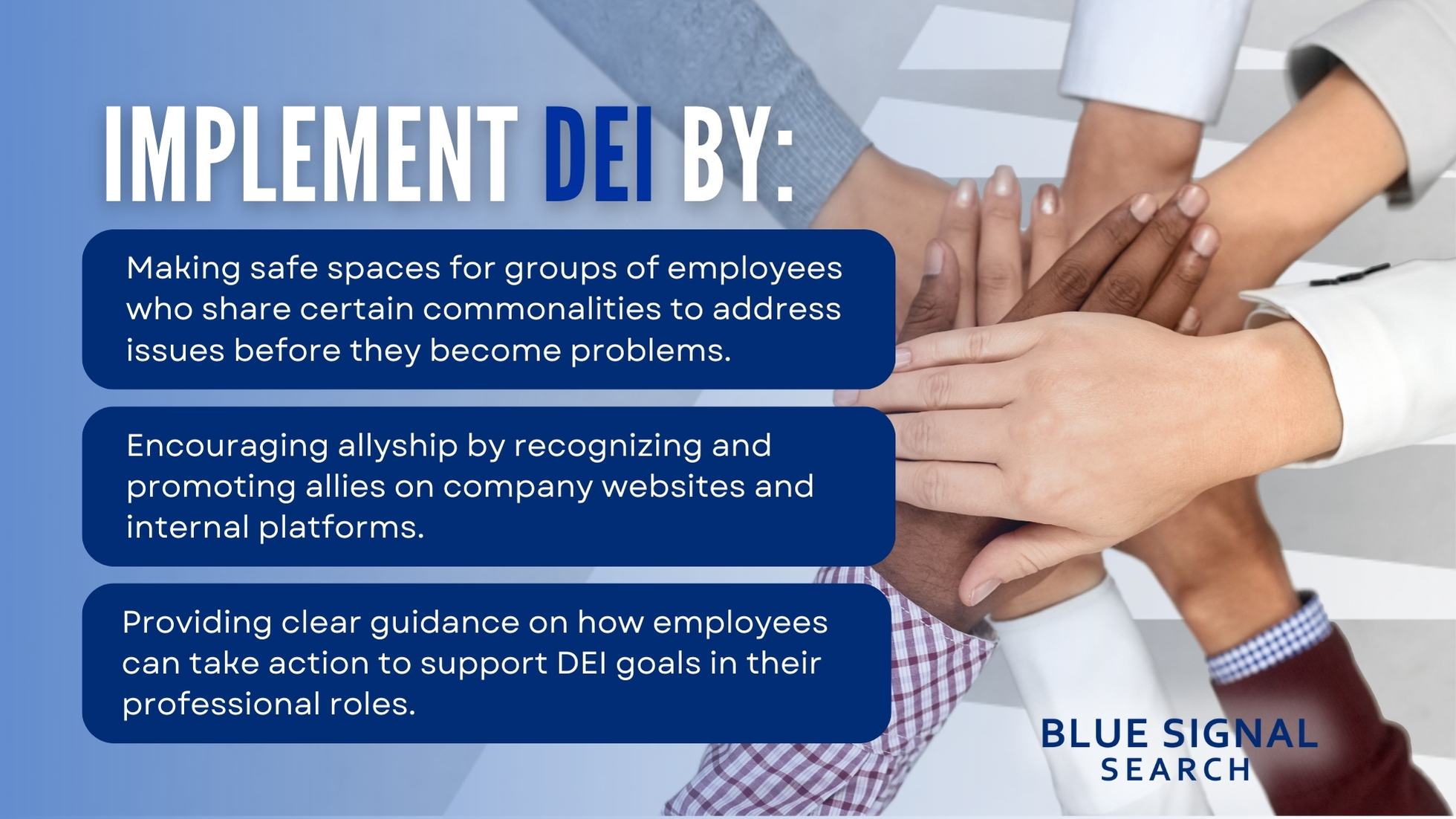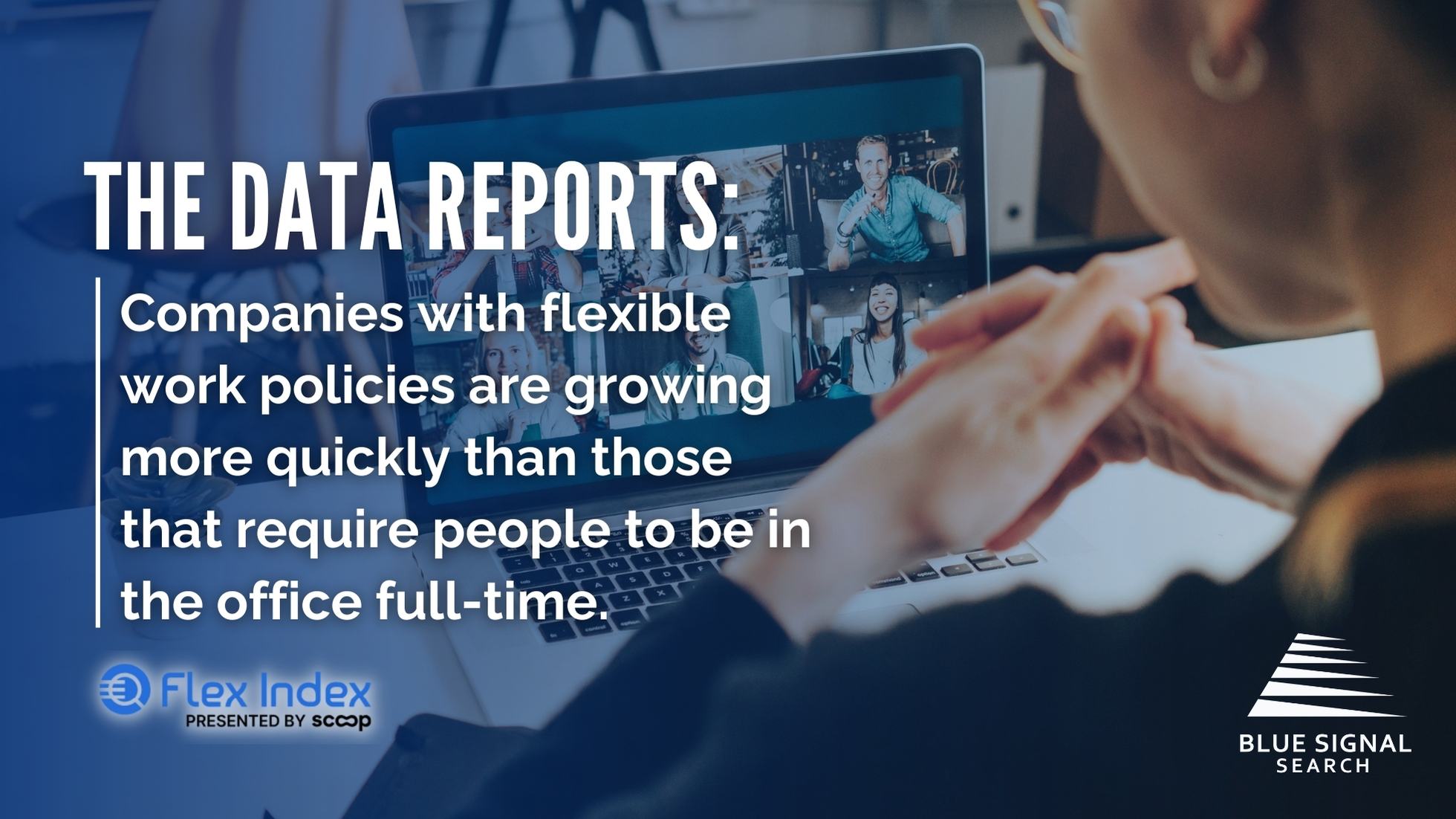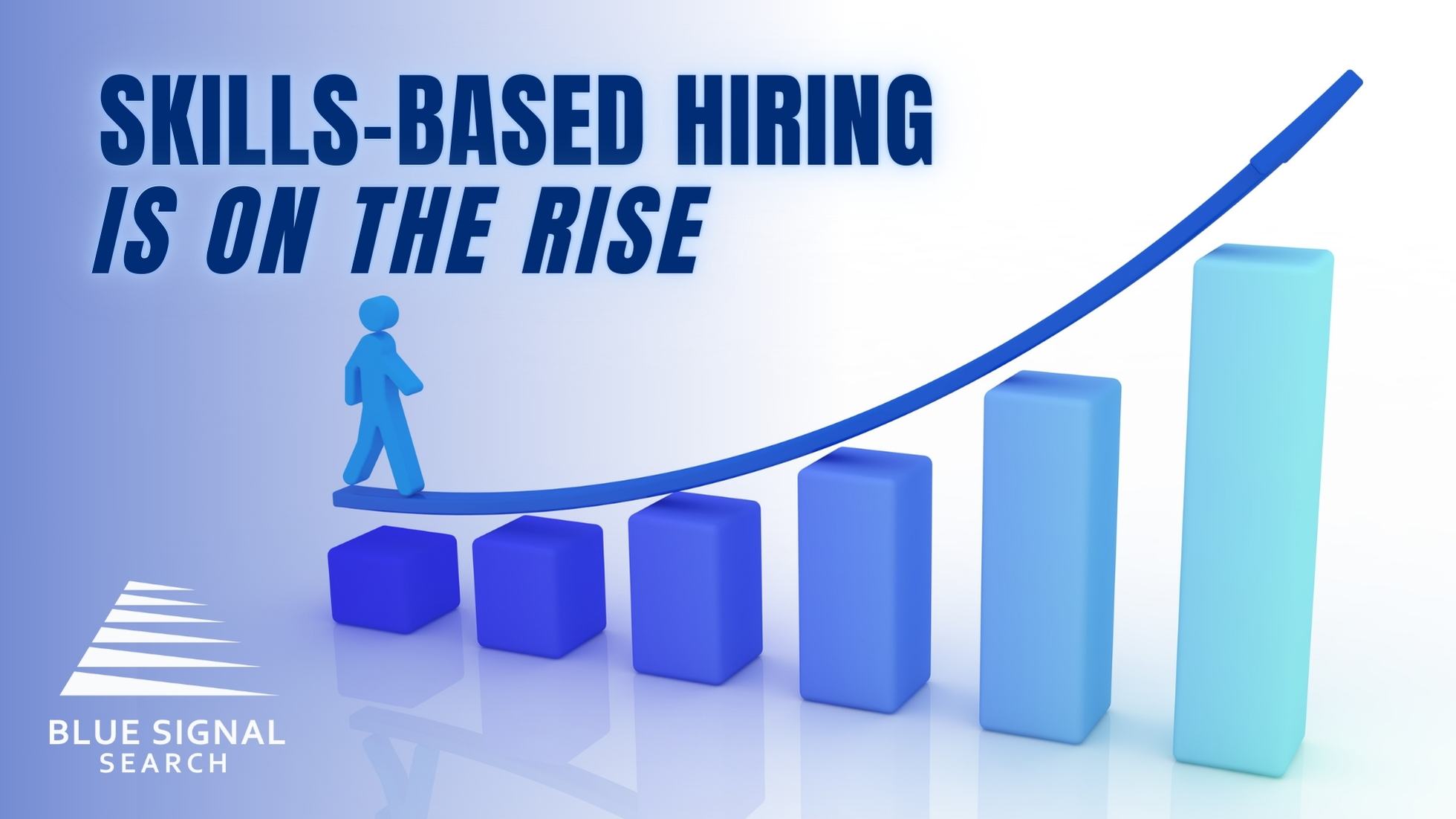Are you keeping up with current recruiting trends? With rapid tech changes and evolving work environments, it's key for businesses to know the latest hiring techniques to attract the best talent. In this comprehensive guide, we'll break down each trend, giving you the lowdown on how to adapt and thrive in the evolving recruiting landscape. We'll examine how each trend impacts hiring processes and the significant role recruiting firms play in navigating these changes. Whether you're a business leader, HR professional, or recruiter, staying ahead of these trends is key to ensuring your company's success in attracting and retaining top talent.
What Are The Top 5 Recruiting Trends for 2024?
2024 is set to be a pivotal year in recruitment, with several key trends emerging. These trends reflect a blend of technology-driven advancements and a shift toward more candidate-centric approaches. Here's a closer look at what’s defining recruitment this year:
- AI and NLP in Recruitment: Advanced technologies for smarter candidate matching.
- Data-Driven Decision Making: Leveraging analytics to optimize recruitment.
- Diversity, Equity, and Inclusion (DEI): Focusing on inclusive recruitment strategies.
- Remote Hiring and Workplace Evolution: Adapting to the rise of remote work.
- Pay Transparency and Skills-Based Hiring: Emphasizing skills and open salary discussions.
As we unpack these recruiting trends, you’ll see how each one brings something unique to the table. They offer fresh perspectives and solutions to the challenges of modern recruitment. By understanding and implementing these trends, you can enhance your hiring processes and attract top-tier talent. And with a recruiter by your side, navigating these trends becomes more intuitive and effective. Let’s dive deeper into the top 5 recruiting trends:
Recruiting Trend #1: AI and NLP
First on our list is the expanding use of Artificial Intelligence (AI) and Natural Language Processing (NLP) in recruitment. Imagine tools that can sift through resumes, pick up nuanced skills from candidate profiles, and even predict job fit – that’s what AI and NLP are bringing to the table. According to Forbes, AI tech is making candidate searches faster and more efficient. But AI in recruitment isn’t just about efficiency. AI and NLP offer a level of depth in candidate evaluation that goes beyond traditional methods. These tools provide deeper insights into candidate profiles, enabling recruiters to make more informed decisions and find the best fit for their organization.
However, integrating AI in recruitment also presents certain challenges. As highlighted by Indeed, while AI, including recruiting chatbots, accelerates certain processes, it may struggle with understanding the subtleties of human language and miss out on qualified candidates. Over-reliance on these tools can lead to a depersonalized recruitment experience, lacking the human touch necessary for gauging a candidate's personality and company culture fit. Therefore, striking a balance between AI efficiency and human judgment is crucial for hiring.
Recruiting Trend #2: Data-Driven Decision Making
Data-driven decision-making is another significant recruiting trend shaping hiring in 2024. This approach relies on analyzing various recruitment metrics to make informed decisions. Critical data points include metrics like candidate source effectiveness, time-to-fill, quality of hire, candidate experience feedback, and retention rates. These insights allow businesses to pinpoint exactly where the best candidates come from, how long it takes to hire them, and the effectiveness of their recruitment strategies. That's the power of data at work. As HR Daily Advisor notes, data-driven recruitment is leading to more efficient processes and better hiring outcomes. It's like having a recruitment roadmap, with data guiding every turn.
What's exciting about this trend is how it transforms recruitment from guesswork into a strategic operation. By adopting a data-driven approach, recruiters can identify the most effective strategies for attracting top talent. They can smartly allocate resources and concentrate efforts in areas most fruitful for high-quality candidate sourcing. This shift from intuition-based to data-driven decision-making is a game-changer in the recruitment industry. It allows companies to fine-tune their recruitment efforts, leading to faster, more effective hiring.
Recruiting Trend #3: Diversity, Equity, and Inclusion (DEI)
Undoubtedly, Diversity, Equity, and Inclusion (DEI) are taking center stage in 2024's recruiting trends. As we progress, the focus on DEI in recruitment practices is becoming more pronounced, mirroring a deeper understanding of the benefits of a diverse workforce. A recent article by Datapeople emphasizes the importance of affirmative action and DEI hiring equity in 2024, highlighting the shift towards more inclusive recruitment strategies.
These strategies are about more than just checking boxes, they aim to foster a truly inclusive workplace. By adopting practices such as blind recruitment and leveraging unbiased AI tools, companies work towards removing biases from their recruitment processes. This focus on DEI not only bolsters a company's brand image but also taps into a wealth of diverse talents and perspectives. A workforce rich in diversity is a powerhouse of innovation, better decision-making, and often sees improved performance.

Recruiting firms that specialize in DEI initiatives, like Blue Signal, are playing a key role in guiding businesses to build more diverse and inclusive teams. It's about creating a workplace that embraces varied experiences, backgrounds, and ideas, thereby enriching the organizational culture and propelling business success.
Recruiting Trend #4: Remote Hiring and Workplace Evolution
Continuing our list of 2024's dominant recruiting trends, remote hiring takes a prominent spot. As Time magazine discusses, remote work is changing the dynamics of recruitment, with companies now able to tap into a global talent pool. This trend is driven by the changing preferences of the modern workforce, where flexibility and work-life balance are increasingly valued. The digital age has made remote work more feasible than ever, with advanced communication tools breaking down traditional office barriers. For companies, this means an opportunity to explore new markets and tap into diverse talents.
Adapting to remote hiring, however, requires a strategic shift in approach. Companies need to look beyond traditional hiring metrics and focus on traits essential for remote work. Skills like self-motivation, effective communication, and time management become paramount. This shift poses unique challenges in assessing these qualities accurately. It's not just about finding the right skills but also about ensuring candidates can thrive in a remote work environment. The transition to remote hiring also necessitates a reassessment of workplace policies and support systems to accommodate remote employees effectively.

Facing these challenges, recruiting firms become invaluable partners in navigating the complexities of remote hiring. They excel at identifying candidates who are not just skilled, but also well-suited for remote work environments, using advanced evaluation tools and methods. Partnering with a recruiting firm eases the transition to a flexible, diverse workforce, helping to effectively navigate the unique challenges of remote hiring.
Recruiting Trend #5: Pay Transparency and Skills-Based Hiring
The rising trend of pay transparency and skills-based hiring is changing the recruitment landscape. According to Forbes, there's a shift towards more open discussions about compensation and an emphasis on skills over formal qualifications. This approach to transparency in discussing salaries builds trust and fosters a sense of equity within the workplace, aligning with a changing job market that values authenticity and ethical practices. Pay transparency not only enhances a company's reputation but also promotes a meritocratic workplace culture, where compensation is clearly aligned with roles, responsibilities, and skills.

Simultaneously, the rise of skills-based hiring is changing how companies approach evaluating potential candidates. This trend, highlighted in a Harvard Business Review article, is shifting the focus away from just formal qualifications to what really matters — practical abilities and real-world experiences. It's a transformative approach that opens new opportunities for individuals who have gained expertise through unique career paths, such as veterans, or self-directed learning. By prioritizing a diverse set of skills, businesses are not only enriching their workforce with a variety of perspectives and capabilities but also ensuring that job roles are filled with individuals who are genuinely equipped to meet their specific demands.
How To Implement 2024 Recruiting Trends into Your Hiring Practice
Looking to integrate these 2024 recruiting trends into your hiring practice? Adapting to these recruiting trends might seem daunting, but with a strategic approach, it can be seamlessly integrated. Start by embracing new technologies like AI and data analytics to enhance your recruitment process. Prioritize DEI to foster a more inclusive workplace, and adapt your hiring strategy to accommodate the increasing importance of remote work, opening up new talent pools. Additionally, focus on pay transparency and skills-based hiring to ensure clear compensation and value the diverse skills candidates bring. Implementing these trends can significantly improve your approach to attracting and retaining talent, positioning your company as a forward-thinking employer.
Why Should I Work with a Recruiter?
In the face of these evolving recruiting trends, working with a recruiter has become more important than ever. Recruiters bring essential knowledge and expertise, helping companies not just keep up but excel in the modern recruitment landscape. They stay updated with the latest technologies and market shifts, providing valuable insights and strategies for efficient talent acquisition. With every hiring decision being critical, a recruiter's expertise is key to securing top talent efficiently and effectively, ensuring your company stays ahead in a competitive market.
Conclusion
In conclusion, the hiring roadmap for 2024 is marked by exciting and transformative recruiting trends. From the integration of AI and data-driven practices to the emphasis on DEI and remote work, these trends are setting new standards in talent acquisition. By staying informed and adaptable, you can successfully implement these trends in your recruitment strategy. Whether you’re looking to refine your hiring practices or seeking guidance, partnering with a recruitment firm can provide the expertise and support needed to navigate these changes.
At Blue Signal, we are committed to helping companies and candidates thrive in this new era of recruitment. Ready to take your recruitment strategy to the next level? Let’s connect and make the most of these exciting recruiting trends.
Partner with us for your next hire.
Set up a free consultation with a recruiting manager. Tell us about your hiring need.
By submitting this form, you consent to receive communications from Blue Signal, including phone calls, emails, and text messages.
